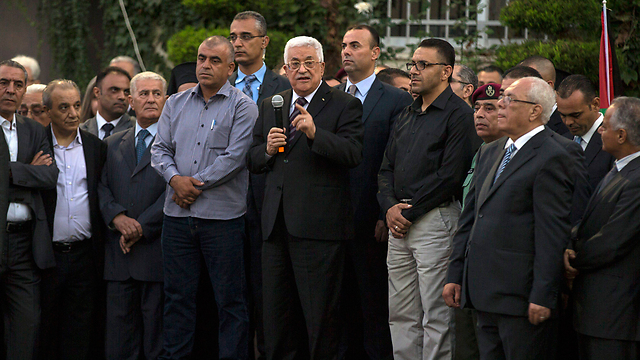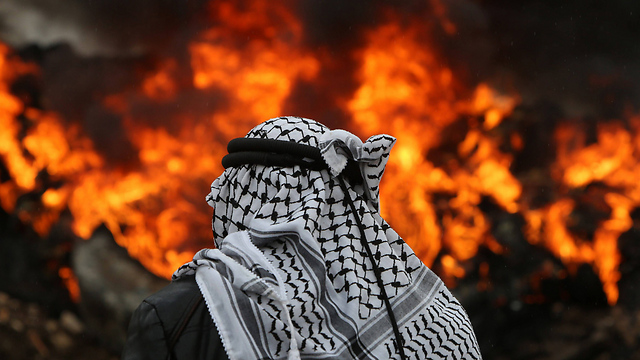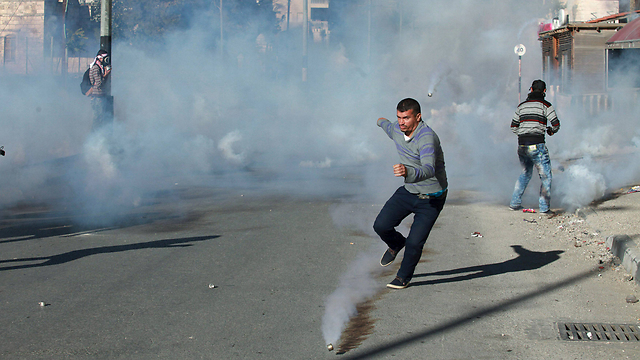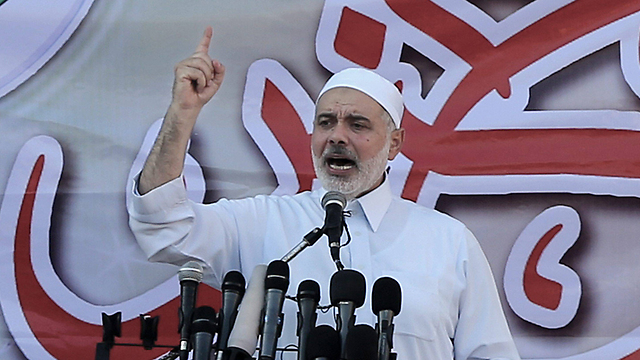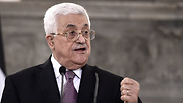

Abbas fears an internal intifada
Analysis: The chairman of the Palestinian Authority is worried that ongoing economic woes will lead to an uprising against him and in recent speeches has focused on social issues. Hamas is waiting for the PA to collapse even though they could be brought down at the same time.
PA Chairman Mahmoud Abbas has given two speeches in the last few weeks, an exceptional occurrence following an extended period in which he was not heard and rarely seen. The Muqata'a is making sure to create noise and to parcel out vague clues regarding the importance of the speeches, in order to gain extensive media coverage among Palestinians.
The first speech came on the last day of 2015, in order to mark the 51st anniversary of Fatah's founding. A few days after that Abbas delivered another speech in Bethlehem.
It would be reasonable to assume that the speeches focused on burning political issues and the current escalation, but Abbas surprisingly dedicated a significant part of his statements to employment and housing for young people.
Addressing youngsters, Abbas said that they are "the tomorrow and future of Palestine" and that he understands their feelings of fury and their distress at the Israeli occupation and lack of a political horizon.
"We are with you in order to turn this anger into energy and to continue building and developing our homeland and society," Abbas said. He then segued into talking about the qualities of the young generation and of the need to build a future and employment opportunities. Exceptionally, he announced the establishment of a national fund to support youth employment.
In his Bethlehem speech Abbas presented his vision for housing for young couples and spoke of the efforts that would be made to build housing units for the next generation.
Abbas' statements did not come out of the blue. Two weeks beforehand the Palestinian Center for Policy and Survey Research, headed up by respected political scientist Khalil Shikaki, published a worrying survey that showed a worrying radicalization among the Palestinian public regarding the current escalation with Israel.
Two thirds of those questioned expressed support for an armed struggle against Israel and said that such a move would better serve Palestinians better than negotiations.
The last time that a majority supported an armed intifada was in 2004. Shikaki estimated that the results of the survey show that Palestinian youngsters are significantly alienated from their leadership, and that they do not consider the political system any more legitimate.
On the same day that the survey was published, Abbas addressed the escalation and said that it is justified, even saying that has grown out of the despair of the younger Palestinian generation.
At the same time, another Palestinian research institute published a survey which questioned Palestinians aged 16-35, thus revealing the frustration of the young generation.
Eighty-four percent of them said that their future is shrouded in danger, while a similar number responded that they do not have sufficient options for the future. Two thirds of those questioned said that the Palestinian Authority is not playing a positive role in the current escalation.
Added to that is the high unemployment rate among young Palestinians in the West Bank, which averages 30 percent. As such, a Palestinian student who completes an accounting degree at a university in the West Bank can consider themselves lucky if they manage to find work as a plasterer. Most stay with a degree in their hand and frustration in their heart.
These surveys, which point to the young generation's dissatisfaction and disappointment with their leadership and join the unemployment statistics, were received by Ramallah like a punch in the stomach.
They were followed by a growing worry in the Muqata'a that the sword is at some point liable to turn inwards against the Palestinian Authority itself. The penny dropped for Abbas after more than three months of a mini-intifada, causing him to change his tone and to try and find a solution to the real problem at a time when a political arrangement with Israel seems – for the foreseeable future – like the stuff of science fiction.
The protests that worry Hamas
Meanwhile, Hamas is doing everything in its power to try and light the fire in the West Bank, while at the same time fanatically and violently guarding budding protests against it in the Gaza. The situation in the Strip is abysmal. While the West Bank's youth has the option to leave for a new life in the big wide world, Gaza's youth does not, by and large, have that option.
The employment rate among young people in Gaza stands at 50 percent. The majority of those who are working are employed in the private sector and earn an average of NIS 740.
The minority of Palestinians who have recently left the Strip tell of terrible suffocation and can even be heard surreptitiously voicing protests against Hamas. They indicated that ideology and politics interests no one. It is doubtful whether any of them would willingly return to Gaza after getting a treasured exit permit.
Following loud whispers, Hamas operatives recently arrested a number of bloggers and activists that probably criticized the government in Gaza. It seems that Hamas is very worried about protests against it, which is also perhaps the reason that the organization's deputy leader Ismail Haniyeh is increasingly seen in public, in the street, at mourning tents and in hospitals. Haniyeh and the Hamas leadership all that they can to broadcast the message "we are with you and we are like you" to the public in the Strip.
Hamas' strategy is to bring the Palestinian Authority to collapse, between Israel's doing and the Palestinian public's doing. It's not clear to what extent it's understood in Gaza that an Arab Spring protest in the West Bank, should it erupt, could within hours – or at most days – catch up with the Gazan public, which is crushed under the burden and under the curfew.
In such an eventuality, Hamas will try to divert fire towards Israel. This is exactly what the organization did when it felt the sword dangling over its neck at the start of summer 2014 – and then Operation Protective Edge began.














